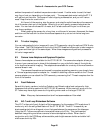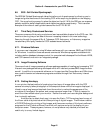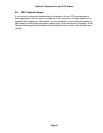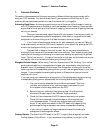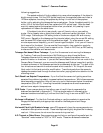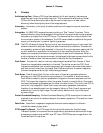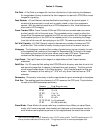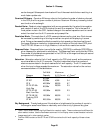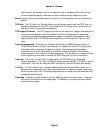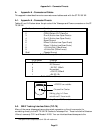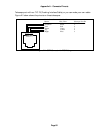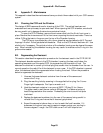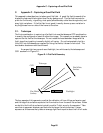
Section 8 - Glossary
Page 48
Flat Field - A Flat Field is a image with a uniform distribution of light entering the telescope.
An image taken this way is called a flat field image and is used with CCDOPS to correct
images for vignetting.
Focal Reducer - A Focal Reducer reduces the effective focal length of an optical system. It
consists of a lens mounted in a cell and is usually placed in front of an eyepiece or
camera. With the relatively small size of CCDs compared to film, focal reducers are
often used in CCD imaging.
Frame Transfer CCDs - Frame Transfer CCDs are CCDs that have a metal mask over some
portion (usually half) of the pixel array. The unmasked portion is used to collect the
image. After the exposure is complete, the CCD can very quickly shift the image from
the unmasked portion of the CCD to the masked portion, thus protecting the image
from light which may still be impinging on the CCD. This acts as an electronic shutter.
Full Well Capacity - Full Well Capacity refers to the maximum number of electrons a CCD
pixel can hold. This number is usually directly proportional to the area of the pixel.
Histogram - The Histogram is a table of the number of pixels having a given intensity for each
of the possible pixel locations of the image file. Remember that, in the end, the image
file is nothing more than a list of pixel values, one for each CCD pixel. These value
numbers can be displayed in two formats; as a table or plotted as a graph.
Light Frame - The Light Frame is the image of an object before a Dark Frame has been
subtracted.
Path/Filter - For PC users the Path setting tells CCDOPS which directory and disk drive to find
and store the image files. In essence, it defines the current directory. The filter controls
which image files are shown in the Open directory. Only files that match the filter are
shown. For example, a filter setting of "*.ST6" will only show files that have an "ST6"
extension.
Photometry - Photometry is the study of stellar magnitudes at a given wavelength or bandpass.
Pixel Size - The smallest resolution element of a CCD camera is the CCD pixel. The pixel sizes
for each of the SBIG cameras are as follows:
Camera Pixel Size (microns)
Tracking CCD13.75 x 16
ST-5C 10 x 10
ST-237 7.4 x 7.4
STV 14.8 x 14.8
ST-6 23 x 27
6
ST-7E/ST-8E 9 x 9 (unbinned)
ST-9E 20 x 20 (unbinned)
Planet Mode - Planet Mode is the most useful way to achieve focus. When you select Planet
mode, a full frame is exposed, downloaded, and displayed on the computer monitor. A
small window can be placed anywhere in the image area and the size of the window
6
The TC241 CCD used in the ST-6 actually has 11.5 x 27 micron pixels. The CPU combines two 11.5
micron pixels to make the 23 micron pixel . This gives pixel with a more square aspect ratio.



